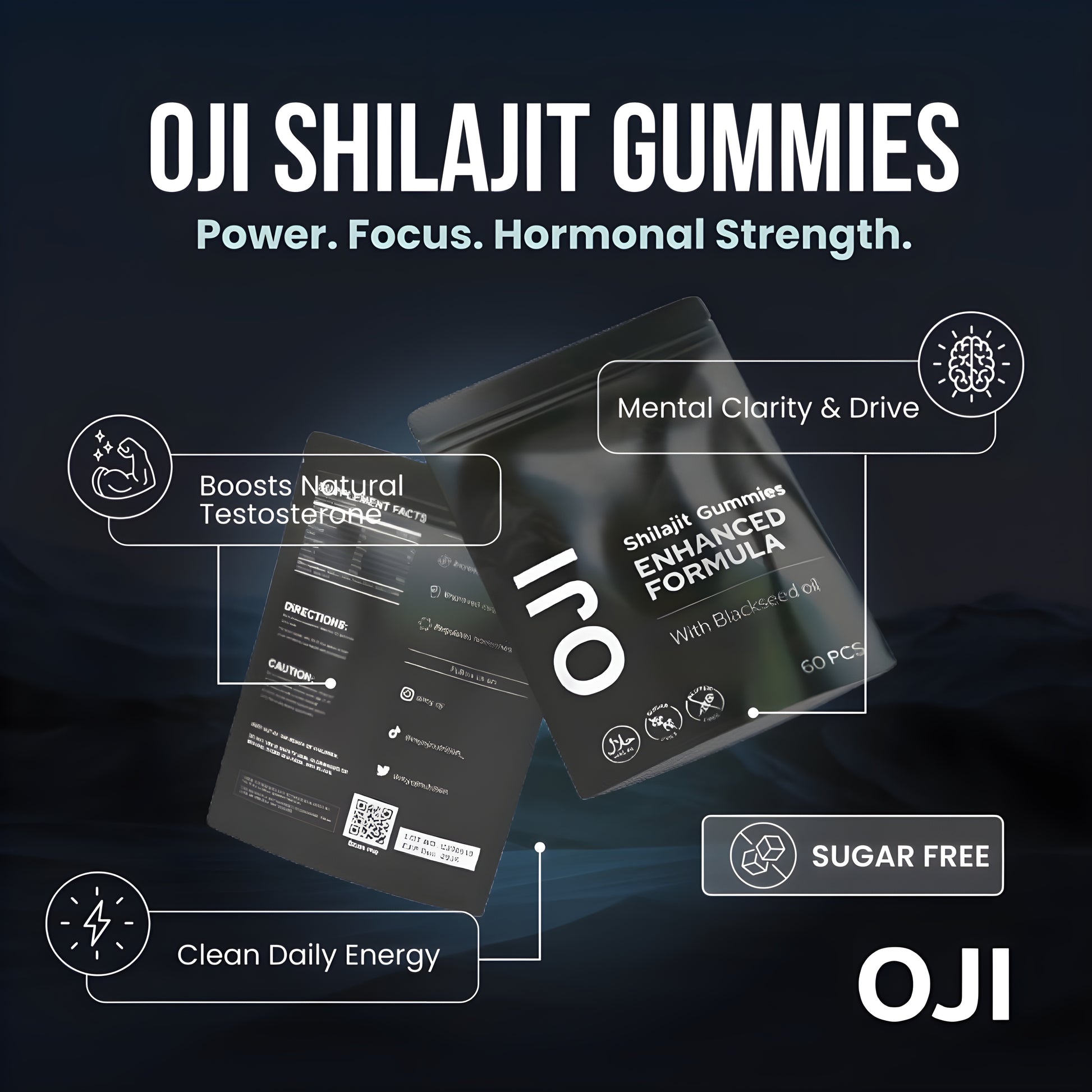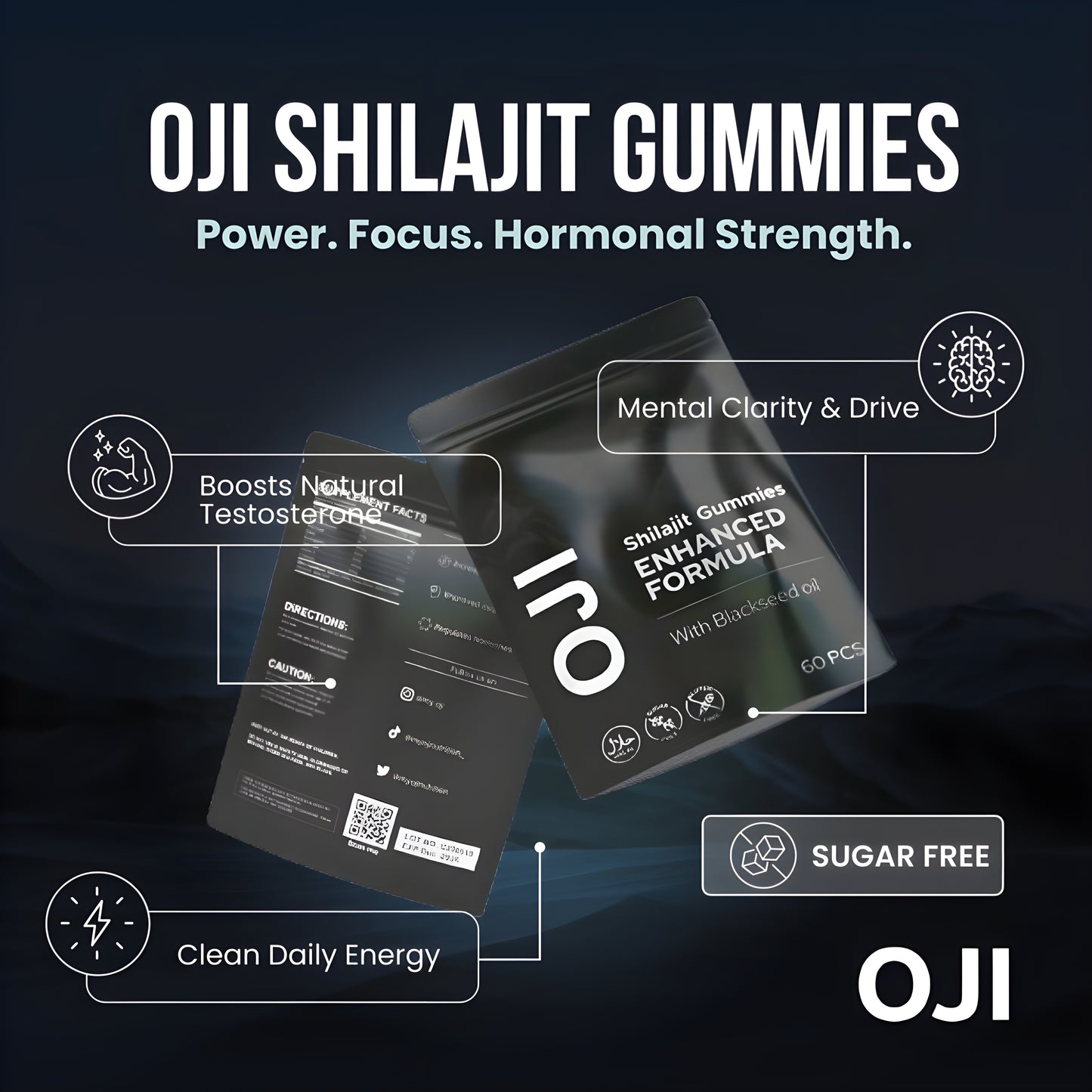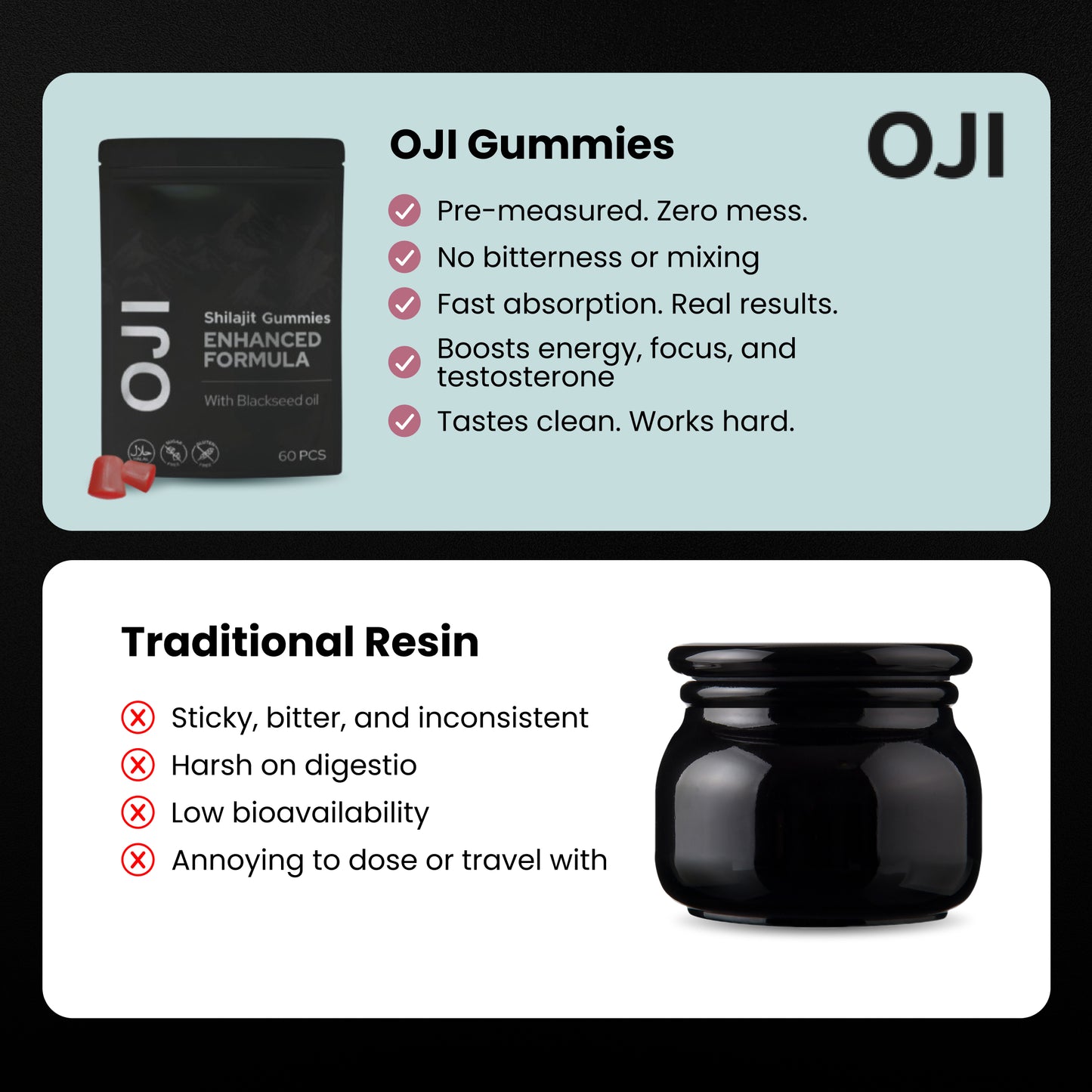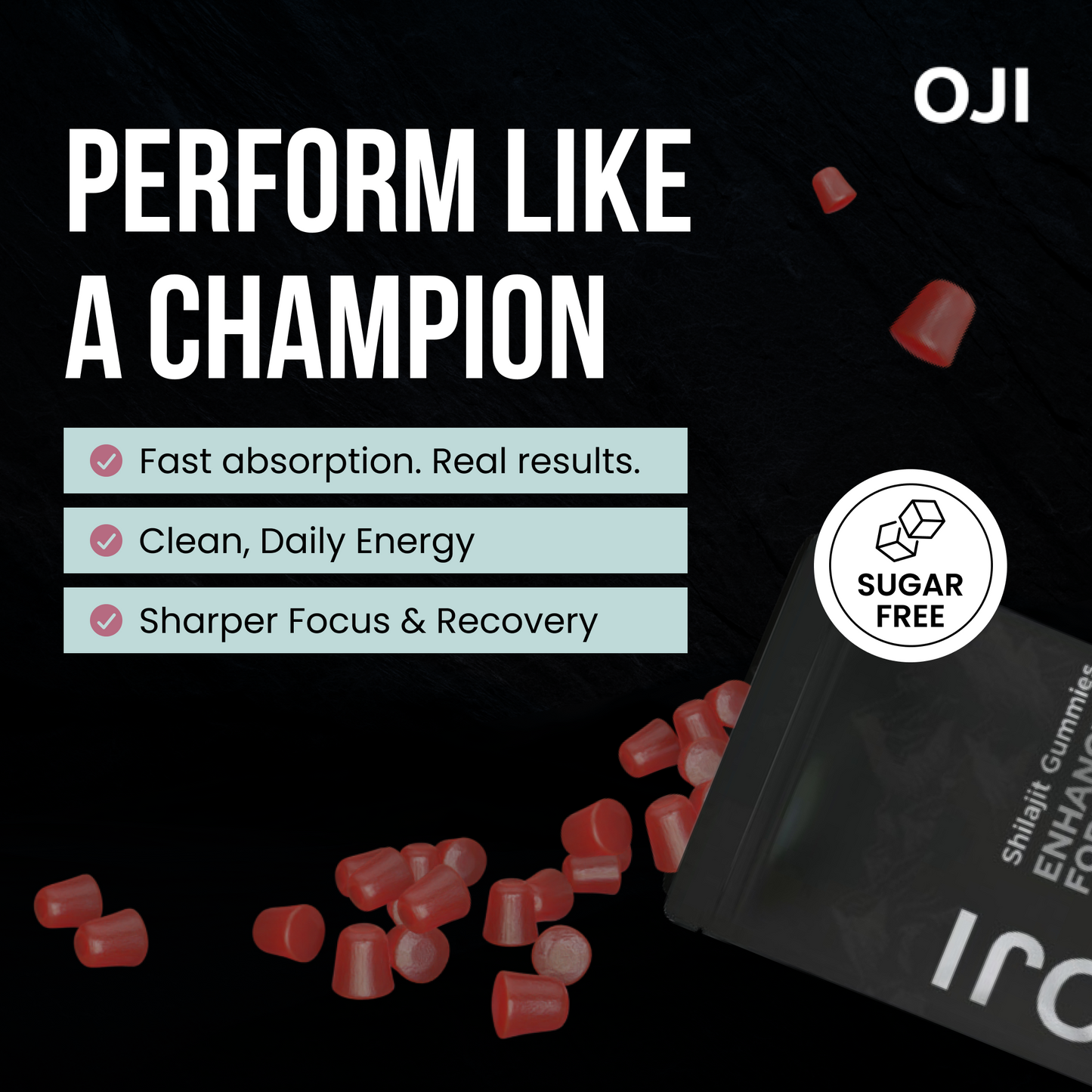If you’re juggling deadlines or kids, that afternoon slump can hit hard. To get your energy back on track, you need a plan. Beating fatigue starts with giving your body the right micronutrients—like B Vitamins, Iron, and Magnesium—to convert food into steady power. This guide will show you how to take action.
Why You Feel Drained And How Vitamins Can Help
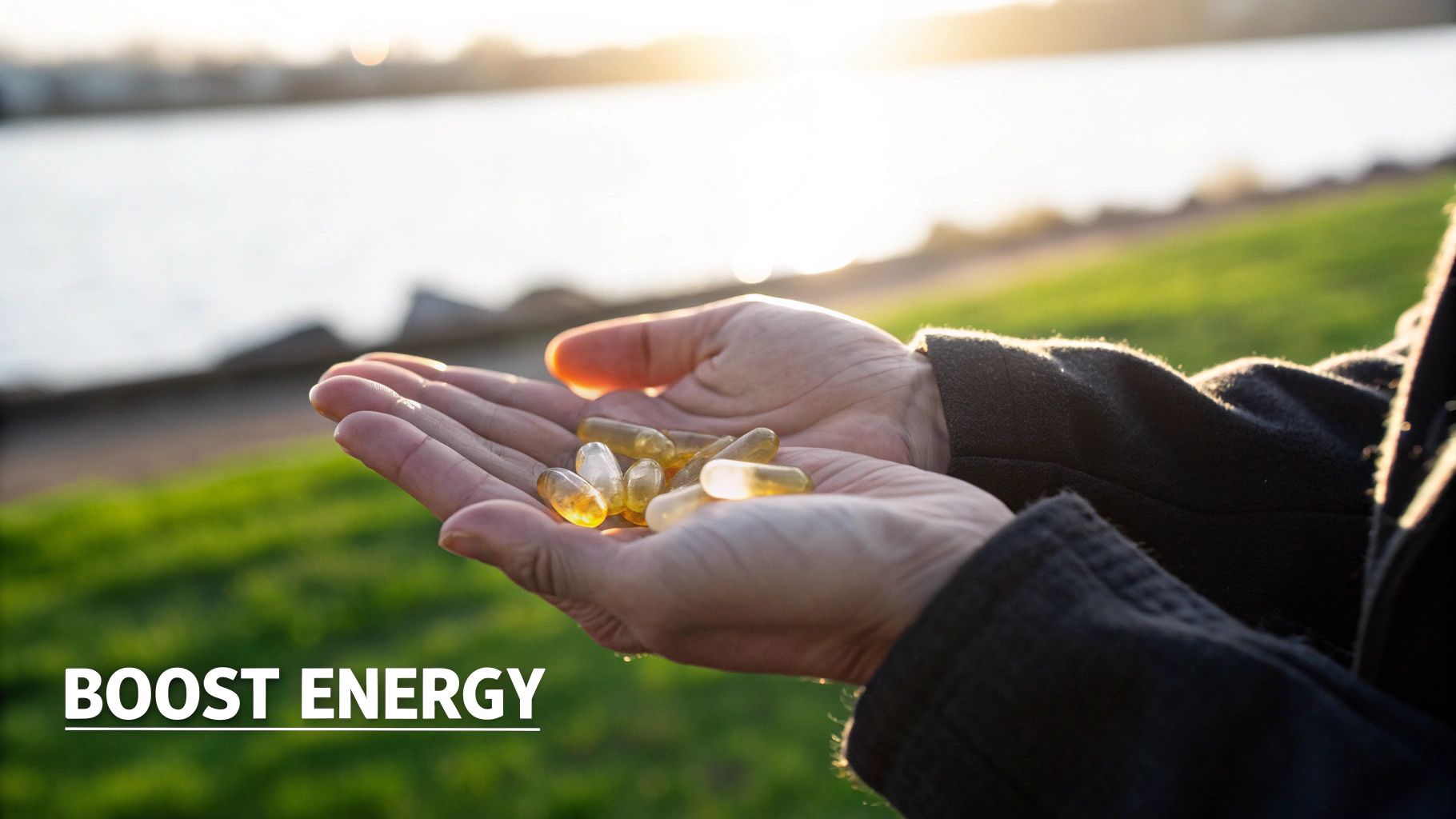
A rough night’s sleep can leave you yawning, but when tiredness lingers, it’s often a sign your body needs specific support. Think of your body as a finely tuned engine. Your food provides the raw fuel, but vitamins and minerals are the spark plugs that ignite it. Without them, even premium fuel won't get you moving.
Your body’s energy currency is ATP (adenosine triphosphate), and its production relies on a precise relay of micronutrients. If you're low on even one, the production line slows down, leaving you feeling sluggish and fuzzy-headed. The first step is to identify what your body is missing so you can take targeted action.
The Connection Between Nutrients And Energy
Here’s a breakdown of the key players and the practical steps to get more of them:
- B Vitamins: These are essential for converting carbohydrates, fats, and proteins into usable energy (ATP). Action Step: Incorporate more whole grains, eggs, and lean meats into your meals.
- Iron: This mineral transports oxygen to your muscles and brain, which is crucial for alertness. Action Step: Pair iron-rich foods like spinach or lentils with a source of Vitamin C (like bell peppers or citrus) to boost absorption.
- Magnesium: This is involved in over 300 biochemical reactions, many of which produce energy. Action Step: Add a handful of nuts, seeds, or a side of leafy greens to your daily diet.
- Vitamin D: It supports muscle function and helps regulate mood, both of which impact energy. Action Step: Aim for safe sun exposure or consider a Vitamin D supplement, especially in winter.
Our growing awareness is mirrored by real-world numbers. In the UK, the dietary supplements market was valued at USD 3.13 billion and continues to expand. One major factor? Roughly 49.5% of adults are low in vitamin D, driving many to seek that extra energy kick. For a detailed look at this trend, explore the United Kingdom Dietary Supplements Market.
“Your energy levels are a direct reflection of your cellular health. Fatigue is often the first and most obvious sign that your cells aren’t getting the nutritional support they need.”
To reclaim your vitality, start by assessing your diet for potential gaps. Remember, low energy often travels with other symptoms like brain fog. To learn more about spotting and fixing this, check out our guide on how vitamin deficiency can cause brain fog.
The B-Vitamin Complex Your Energy Production Crew
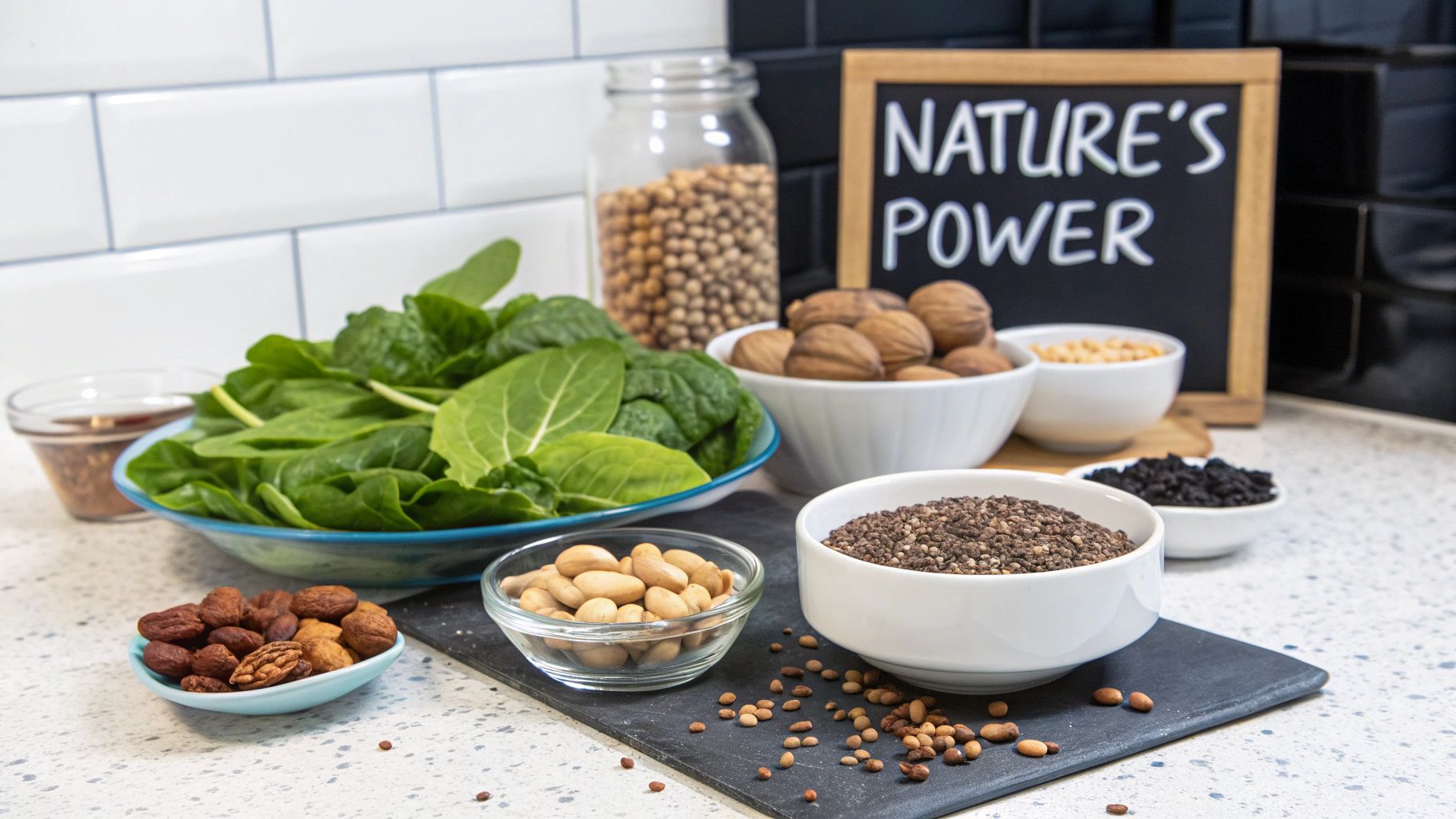
Think of your body as a factory. The food you eat is the raw material, but the B-vitamin complex is the skilled crew that turns it into usable energy. Each B vitamin has a specific job, but they all work together to produce ATP. If even one member of this crew is missing, the whole production line slows down, leaving you feeling flat.
This isn’t just theory. The UK energy drinks sector, now worth around USD 4.79 billion, routinely boosts its products with B6 and B12 to help ward off fatigue. For a deeper dive into those market trends, check out the Grand View Research report.
Meet The Key Players On The Assembly Line
While all eight B vitamins matter, focus on these three for a noticeable energy boost:
- Vitamin B12 (The Foreman): Directs the creation of red blood cells that carry oxygen to your muscles and brain. A B12 shortfall leads to serious tiredness.
- Vitamin B6 (The Technician): Helps unlock stored energy from your liver and muscle reserves so you can stay alert and active.
- Folate (Vitamin B9, The Quality Controller): Works with B12 to build and repair DNA, ensuring your red blood cells form correctly to keep your energy pipeline clear.
Who Is At Risk For B-Vitamin Deficiency
Certain lifestyles and diets can create B-vitamin gaps. Since your body doesn't store most B vitamins for long, you need a consistent daily supply.
For example, B12 absorption from food can decrease after age 60, with an estimated 6% of people in this age group having a B12 shortfall. Vegans and vegetarians are also at higher risk, as B12 is primarily found in animal products.
“When even one B vitamin is missing, the entire energy production process can slow down, impacting your daily vitality.”
Actionable Steps to Boost Your B-Vitamins:
- Eat a variety of B-rich foods: Make a conscious effort to include leafy greens, whole grains, eggs, lean meats, and oily fish in your weekly meal plan.
- Try fortified options: If you're plant-based, look for fortified cereals or add nutritional yeast to your meals for a B12 boost.
- Consider a supplement: If your diet is restrictive or you suspect a deficiency, a high-quality B-complex supplement can effectively fill the gaps and support your energy crew.
Harnessing Minerals for All-Day Stamina
While B vitamins are the workers, minerals like iron and magnesium are the essential machinery. Without them, your body's energy factory grinds to a halt. Taking action to ensure you have enough of these two minerals can make a significant difference in your daily stamina.
Think of iron as your body's oxygen delivery service. It’s the core of haemoglobin, the protein that carries oxygen from your lungs to every cell. When oxygen arrives, your cells can create energy. An iron shortage is like a delivery fleet running on half-power; everything slows down, leading to fatigue and weakness.
Magnesium is the 'master switch' for your cellular power plants. It’s involved in over 300 biochemical reactions, many of which are directly tied to converting food into energy. When magnesium is low, these processes become sluggish, leaving you drained.
The Role of Iron in Oxygen Transport
Iron deficiency is a leading cause of anaemia and fatigue worldwide, especially for menstruating women. To keep your iron levels topped up, take these simple steps:
- Combine Food Sources: Your body absorbs heme iron (from meat, poultry, fish) more easily than non-heme iron (from spinach, lentils, beans). Try to include a mix in your diet.
- Pair with Vitamin C: To dramatically improve the absorption of plant-based iron, always pair it with foods rich in vitamin C. A practical example is squeezing lemon juice over a spinach salad or having orange juice with an iron-fortified cereal.
This visual guide breaks down how to get enough of these vital minerals.
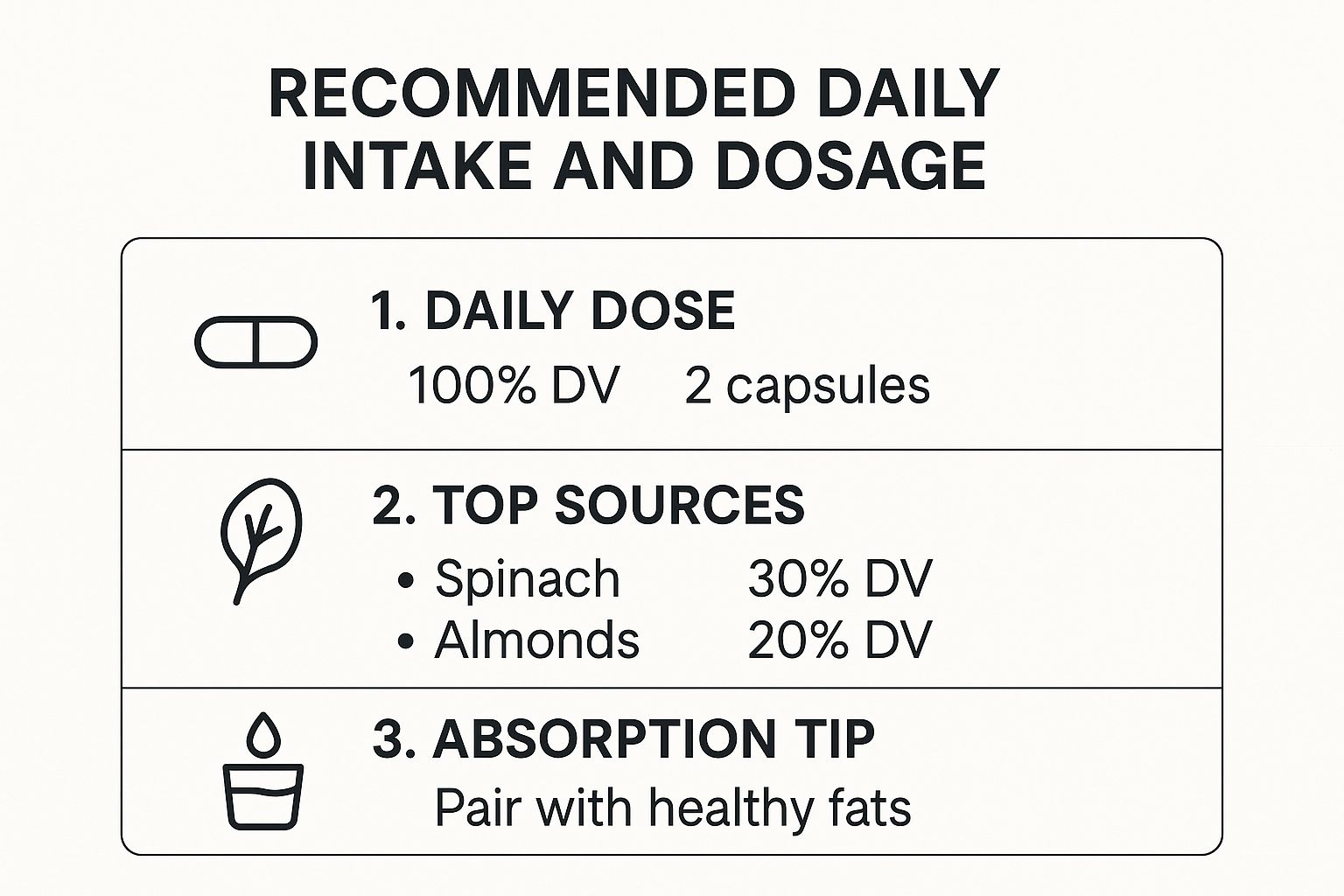
As you can see, using smart food pairings, like adding healthy fats with your meals, can make a huge difference in how well your body absorbs these crucial nutrients.
Why Magnesium Is a Game-Changer
Magnesium also supports muscle function, nerve signals, and a steady heartbeat. The problem? Nearly half of us don't get enough from our diet.
Low magnesium often shows up as muscle weakness, fatigue, and even poor sleep, which stops your body from properly recharging overnight.
Actionable Steps to Boost Your Magnesium:
- Focus on magnesium-rich foods: Make it a habit to include dark leafy greens, nuts, seeds, and whole grains in your daily meals.
- Consider a supplement: If you struggle with muscle cramps or poor sleep, a magnesium supplement before bed can support recovery and energy levels.
Beyond these key minerals, a whole spectrum of micronutrients works together to support your vitality. To dive deeper, check out our guide on the benefits of trace minerals. By taking these practical steps, you can ensure your body's energy systems are supported from the ground up.
Protecting Your Cellular Powerhouses

Your body's energy production creates byproducts, a type of cellular exhaust called oxidative stress. If this builds up, it damages your cellular machinery (mitochondria), leaving you fatigued. Vitamin C and Coenzyme Q10 (CoQ10) are the clean-up crew that protects your cells.
They work by neutralising harmful free radicals and shielding your mitochondrial powerhouses from daily wear and tear.
- Neutralise Free Radicals: Vitamin C donates electrons to stabilise damaging molecules.
- Boost Iron Uptake: Vitamin C can enhance your body's absorption of iron from meals by up to 80%.
- Guard Membranes: CoQ10 protects mitochondrial membranes from damage.
- Fuel ATP Production: CoQ10 is a key part of the energy assembly line, keeping it running smoothly.
Vitamin C Action Steps
Start your day with 500 mg of vitamin C at breakfast to establish your antioxidant defences early. For all-day protection, split your dose between morning and afternoon.
- Pair it effectively: Take your vitamin C with iron-rich foods like leafy greens or enjoy it with citrus fruits to maximise absorption synergy.
- Mind the dose: Avoid taking more than 1g in one go, as this can sometimes cause digestive discomfort.
- Consider alternatives: If you have a sensitive stomach, liposomal vitamin C formulations offer better cellular uptake with less irritation.
CoQ10 Defence Essentials
A daily dose of 100–200 mg of CoQ10 provides excellent support for your mitochondria and heart muscle. To get the most out of it, always take it with a meal that contains healthy fats, which aids absorption.
- Electron Support: CoQ10 is vital for the chain reactions that produce energy.
- Antioxidant Shield: It also helps regenerate other antioxidants, giving your cells a robust, multi-layered defence system.
“Strong cellular shields translate into steady, long-lasting energy.”
Here’s a quick-glance action guide:
| Nutrient | Actionable Dose | Best Time to Take | How to Pair It |
|---|---|---|---|
| Vitamin C | 500–1000 mg | Morning & afternoon | With iron-rich foods |
| CoQ10 | 100–200 mg | With a main meal | With healthy fats |
Fortify Your Daily Routine
Think of Vitamin C as your daily, water-soluble energy booster and CoQ10 as the dedicated guardian of your cell membranes. Follow these steps to integrate them effectively:
- Check your multivitamin: Ensure it contains at least 250 mg of vitamin C to cover any dietary gaps.
- Choose your CoQ10: CoQ10 is available as ubiquinol or ubiquinone. Both are effective; choose based on your budget and absorption needs.
- Consult your doctor: If you're on high-dose statins, speak with your doctor before adding CoQ10 to your routine.
Keep an Eye on Your Cellular Health
You don't need complex tools to see what's working. Action Step: Keep a simple log of your daily energy levels and how quickly you recover from exercise. This will help you spot trends and confirm that your new routine is effective. If you adjust your dosage, do it gradually and note any changes in fatigue or performance.
Combine with Lifestyle Practices
While antioxidants are great for internal support, your daily habits complete the picture.
- Prioritise sleep: Aim for 7–9 hours of quality sleep each night. This is when your mitochondria repair and recharge.
- Hydrate consistently: Drink water throughout the day to help transport nutrients in and flush waste out.
- Move your body: Include moderate exercise in your week to encourage the growth of new, more efficient mitochondria.
By combining targeted vitamins, CoQ10, and healthy habits, you’re not just chasing energy—you’re building a robust foundation for it. For extra support, explore how Oji Shilajit gummies can complement your routine, as they are designed to work with energy-boosting vitamins.
Boosting Energy with Adaptogenic Support
Chronic stress is like a slow leak in a tyre. You can keep pumping it up with coffee, but you’re not fixing the root problem. Adaptogens are the expert mechanics who find the leak and patch it properly. These natural compounds help your body adapt to and recover from physical and mental stressors. By stabilising your main stress hormone, cortisol, they prevent the energy crashes that come from being constantly on edge.
One of the most powerful adaptogens is Shilajit, a potent resin from high-altitude mountain rocks. It’s packed with fulvic acid and over 85 trace minerals. This combination unlocks deep cellular energy by supercharging your mitochondria.
How Shilajit Works
Shilajit gets your cellular power plants running at peak efficiency.
- Fulvic acid acts like a master key, opening cells so more nutrients can enter.
- The 85+ minerals nourish the enzymes responsible for creating energy.
- This makes your mitochondria—the engines of your cells—work smarter, not harder, leading to a steady supply of energy (ATP).
Adaptogens don't just work on mitochondria; they help rebalance your entire stress response system, building a foundation for long-term vitality. It's a holistic approach that works brilliantly alongside your energy-boosting vitamins.
Integrating Oji Shilajit Gummies
Life is busy, which is why Oji Shilajit gummies make getting adaptogenic support effortless. Just two delicious gummies provide a balanced dose of Shilajit’s fulvic acid and minerals, plus Ashwagandha and Lion’s Mane.
Your 3-Step Action Plan:
- Take two gummies first thing in the morning.
- Have them with a glass of water or your morning juice.
- Stay consistent for at least two weeks to feel the stable, sustained benefits.
They slot seamlessly into any routine. For a brilliant synergistic effect, try taking them just after your daily multivitamin. To learn more, check out our guide on adaptogens for energy.
It's clear that people in the UK are getting serious about their energy. The dietary supplements market has already hit USD 4.79 billion and is projected to double soon. You can learn more about these market growth findings here.
Here's how adaptogens and vitamins compare:
| Approach | Focus | Actionable Benefit |
|---|---|---|
| Vitamins | Filling nutrient gaps | Provides direct fuel for ATP |
| Adaptogens | Building stress resilience | Creates sustainable, stable vitality |
The real magic happens when you use them together.
Actionable Steps to Get Started:
- Assess your stress levels: Identify what triggers your fatigue. Is it work, lack of sleep, or something else?
- Start incorporating Oji Shilajit gummies alongside your regular energy-boosting vitamins.
- Track your energy patterns over a few weeks and adjust the timing if needed.
“Building stress resilience is just as crucial as topping up your nutrient levels.”
By weaving adaptogens into your routine, you’re not just chasing a temporary buzz. You're building a resilient foundation that keeps your energy steady, even when life gets chaotic. Combine Oji Shilajit gummies with your core vitamins and healthy habits for a truly resilient system.
A few extra tips:
- Keep a journal: Track your energy, mood, and stress levels to see your progress.
- Be consistent: Take your supplements at the same time each day to build a routine.
- Listen to your body: If you experience any changes, adjust your dose gradually.
As always, it's a good idea to chat with a healthcare professional before starting any new supplement, especially if you have an existing health condition.
Building Your Personal Energy Plan
Knowing which nutrients boost energy is one thing; putting that knowledge into action is what creates real change. This is where you move from theory to practice by creating a simple routine that fits your life. It’s about being strategic—combining the right foods, foundational supplements, and powerful adaptogens to tackle fatigue at its root.
Step 1: Start with a Quick Self-Assessment
Before adding anything new, take a moment to check in with yourself. A quick inventory of your diet and lifestyle will highlight potential nutrient gaps and guide you toward the vitamins that will help you most.
Ask yourself these questions:
- What’s on my plate? Am I eating a good mix of colourful fruits and vegetables? Am I getting enough lean protein and healthy fats? If you’re plant-based, are you ensuring an adequate intake of iron and B12?
- How’s my lifestyle? What are my daily stress levels really like? Am I getting a solid 7-9 hours of quality sleep? Am I relying too much on caffeine or sugar to get through the day?
- When does my energy tank? Is it the classic mid-afternoon slump, or do I wake up feeling drained?
Your answers are the clues. If high stress and poor sleep are the main culprits, adaptogens and magnesium could be game-changers. If your diet is restrictive, B-vitamins might be what you’re missing.
Step 2: Create Your Foundational Routine
Once you have a clearer picture, build a simple, effective routine. The secret is to combine complementary elements rather than expecting one nutrient to do all the work.
Your Actionable 4-Step Plan:
- Whole Foods First: Always start here. Prioritise a diet packed with nutrient-dense foods like leafy greens, nuts, seeds, and lean proteins to give your body the raw materials for energy.
- Cover Your Bases: Add a high-quality multivitamin to fill common gaps, especially in vitamins D, C, and the B-complex. This ensures your fundamental needs are met.
- Add Targeted Support: Based on your self-assessment, bring in a specific supplement. If stress is your biggest energy thief, adding Oji Shilajit gummies can provide powerful adaptogenic support to build resilience.
- Stay Consistent: Take your supplements around the same time each day to build a habit and allow your body time to adjust. Consistency is key to seeing real benefits.
Think of it like layering. You start with a solid foundation of a good diet, add in essential vitamins to cover the basics, and then bring in targeted support like adaptogens. It’s a complete plan for building sustainable energy from the ground up.
Your Questions on Energy Vitamins Answered
Trying to make sense of supplements can be confusing. Let’s cut through the noise and answer the most common questions about energy-boosting vitamins with practical, actionable tips.
How Long Does It Take for Energy Vitamins to Work?
The honest answer is: it depends. The speed of results comes down to which vitamin you’re taking and how low your levels were.
If you’re deficient in a water-soluble vitamin like B12 or vitamin C, you might feel a difference in as little as 7–14 days. However, rebuilding mineral stores like iron takes longer—often 4–12 weeks of consistent intake.
“Vitamins are not an instant fix; they gradually top up your body’s reserves for steady power.”
Actionable Tip: Be patient and consistent. Track how you feel in a simple journal. If you're not noticing improvements after a month, consider getting a blood test to check your nutrient levels and see if you need to adjust your dosage or strategy.
Can I Take Multiple Energy Supplements Together?
Yes, and it's often more effective! Many nutrients work as a team. For example, taking vitamin C with iron significantly boosts iron absorption. The key is to be smart about it and avoid overdoing fat-soluble vitamins (A, D, E, K), which can build up in your system.
Here’s a simple action plan for combining supplements:
- Start with a good multivitamin as your foundation.
- Layer on a targeted supplement to meet a specific need, like Oji Shilajit gummies for stress support.
- Time your minerals: If you take high-dose iron or magnesium, have them at different times of the day to prevent stomach upset and improve absorption.
Taking supplements in a thoughtful sequence maximises absorption and reduces digestive upset.
Are There Side Effects of Taking an Energy Boost Vitamin?
Energy vitamins are very safe when you stick to the recommended doses. However, taking too much can cause issues. For instance, an overload of iron can lead to nausea, while very high doses of B6 over a long period have been linked to nerve irritation.
Actionable Steps for Safe Supplementation:
- Always read the label: Check the dosage per serving and look for any potential interactions with medications you take.
- Check for stimulants: Be aware if a formula contains caffeine or other herbal extracts that might make you feel jittery.
- Look for third-party testing: This indicates that the product has been checked for quality and label accuracy.
If you notice any persistent side effects, stop taking the supplement and consult your doctor.
What Is the Best Time of Day to Take Energy Vitamins?
Timing can make a real difference. Use this simple schedule as a starting point to optimize your routine:
- Morning (with breakfast): Take your B-complex vitamins to help kickstart your metabolism for the day.
- Late morning or noon: This is a great time for iron, ideally on an empty stomach or with a source of vitamin C.
- Evening: Take magnesium 1-2 hours before bed to support muscle recovery and promote restful sleep.
Simple timing tweaks to try:
- Have your B vitamins with your first meal.
- Take iron at least two hours away from calcium-rich foods (like dairy), as calcium can interfere with absorption.
- Schedule your magnesium supplement for before bed to aid relaxation.
Smart timing fine-tunes your energy rhythm and improves absorption.
Give each timing adjustment a week and note how you feel. It’s about experimenting to find what works best for your body. Consistency is the secret ingredient for boosting energy without the dreaded afternoon crash.
Ready to explore a balanced energy routine? Add Oji Shilajit to your daily regimen for enhanced adaptogenic support. Shop now at myoji.co.uk


